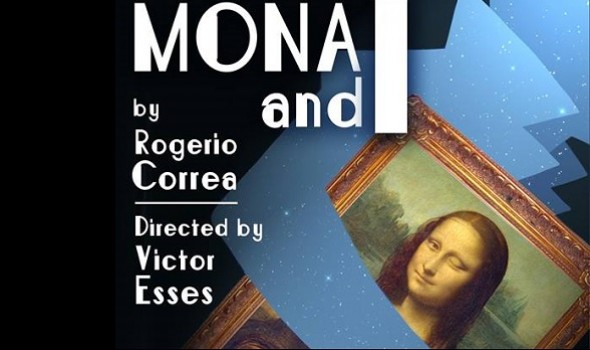Mona Lisa: a story for our time
Mona Lisa: a story for our time

A poor immigrant is at the centre of a new play that recently premiered in London – and many migrants had a hand in the production.
The writer of Mona And I, Rogério Corrêa, has Brazilian roots but lives in London, where he gained an MA in scriptwriting at Goldsmiths, University of London and a BA in Brazilian, Portuguese and African Studies at King’s College.
It was directed by Lebanese-Brazilian theatre-maker Victor Esses.
Set, costume and props designs were by Sunny Jeon, who spent three years with a theatre company in Seoul, South Korea and “is currently based in London working on projects in Europe and Asia.”
It was part of the Contemporary Latin American Writers Festival, which aimed to confront London audiences with “the vibrant talent driving the new creative scene from Latin America.”
The venue was the Cervantes Theatre in London, which stages plays Spanish and Latin American plays, performed in both Spanish and English. The company behind the theatre acts as a cultural link between the UK, Spain and Latin America and is the brainchild of Spanish director, actor, and producer Jorge de Juan, who came to London in 2013 to set it up.
Corrêa is explicit about the links between the story he tells – about the theft of the world’s most famous painting from the Louvre in Paris in 1911 – and events in the UK today.
The thief, Vincenzo Peruggia, was led astray by claims by Italian nationalists’ that the Mona Lisa painting had been seized in Italy by France’s most famous military leader and politician, Napoleon Bonaparte. So Peruggia decided to steal it back and return it to Italy, “where it belongs”.
Corrêa became fascinated by the story when he learned about it at school: “Peruggia was an artist but he ended up painting walls at the Louvre, which is very tragic. But he was a nationalist,” Corrêa explained when I interviewed him. “All these things resonate to me – about how an artist is struggling, and the age of nationalism we are living in now.”
The tale departs from history when the Mona Lisa starts to talk: “Since he [Peruggia] brought Mona Lisa [to Italy] for two-and-a-half years, nobody knows what happened,” said Corrêa. “I thought it might be interesting if she came alive and encourages Peruggia to calm down and come back to art.”
She not only teaches Peruggia to become a better painter, but explains to him that, rather than being stolen by Napoleon – Fake news! - the portrait was taken to France by the artist, Leonardo Da Vinci, himself.
She also makes Peruggia see that his nationalism and hate against the “French thieves” are not based on reality. The parallels with 2017 are clear: some people today live private worlds of prejudice and anger, believing the stereotypes created and reinforced by the media and by extreme-right and hard-core anti-immigration campaigners who spread negative news about immigrants stealing jobs, creating instability, challenging mainstream British culture and conducting terrorism attacks, while ignoring the positive news that migrants are net contributors to economic growth, creating jobs and fertilising culture.
This focus on the negative contributes to the rise in anti-immigration sentiment and suggests that society has no room for “strangers” or “others”.
At the end of the play, Peruggia realises how irrational his nationalism had been, and peacefully says goodbye to Mona Lisa after returning her to the Louvre.
The talking Mona Lisa is like the objective and credible voices today that can help people see the facts and think rationally. Hopefully one day everyone will emerge from their “echo-chambers” and enjoy the richly diverse world around them.
The diversity of voices heard at festivals such as CLAW is one of the ways of helping this happen.
“I have a massive passion for Latin American culture, so do the members of the theatre,” says festival organiser Nic Knight. He says the festival had been well-received, “so maybe we will have it again next year”.
• For more information about Mona and I and the CLAW festival, visit:
https://www.clawfestival.com/
• https://twitter.com/CLAW_Festival?ref_src=twsrc%5Etfw&ref_url=http%3A%2F%2Fnicknightmanagement.com%2F


